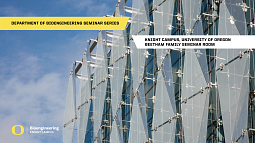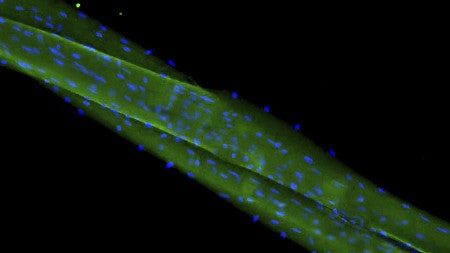1:00–2:00 p.m.
This seminar will feature two PhD candidates from the Knight Campus sharing their research in biomaterials and cancer biology:
-
Phillip Hernandez (Benoit/Guldberg Labs) will present “Engineering Polymeric Nanoparticles for Efficient siRNA Delivery to Human Chondroprogenitor Cells as a Therapeutic Strategy for Osteoarthritis,” focusing on targeted delivery approaches to support cartilage regeneration.
-
Maya Kasteleiner (Dalton/Lindberg Labs) will present “Topographical Guidance of Glioblastoma Migration on Aligned Microfiber Scaffolds,” highlighting the role of scaffold architecture in influencing tumor cell behavior.
Part of the 2025–26 Bioengineering Seminar Series. All are welcome to attend.
9:00 a.m.–8:30 p.m.
This annual event offers undergraduates from all majors a vibrant, inclusive forum to showcase their research and creative work through a variety of presentation platforms. The event celebrates inquiry and discovery across disciplines, helps students build communication and professional skills, and connects them with peers, faculty, and mentors. Whether attending or presenting, students at any stage in their academic journey will gain confidence, expand their networks, and continue strengthening their pathways to success.
The General Agenda on the website gives an overview of events throughout the day. The searchable schedule will be posted at urds.uoregon.edu/symposium closer the event.
3:00–5:00 p.m.
Please join the Knight Campus Department of Bioengineering and Graduate Internship Program during the program/track specific ceremony times on Monday, June 15, 2026 at the Knight Campus.
-
3:00-3:20pm - Bioengineering PhD Commencement Ceremony
-
3:30-3:50pm - KCGIP Sensors/Polymers Master's Commencement Ceremony
-
4:05-4:25pm - KCGIP Semi/Optics Master's Commencement Ceremony
-
4:40-5:00pm - KCGIP Bioinformatics Master's Commencement Ceremony
Graduates, please RSVP here by May 20, 2025. For questions graduates can contact their programs recruiters and advisors (KCGIP@uoregon.edu or bioengineering@uoregon.edu).
BIOE Science Seminars
MORE KNIGHT CAMPUS NEWS »
event videos




